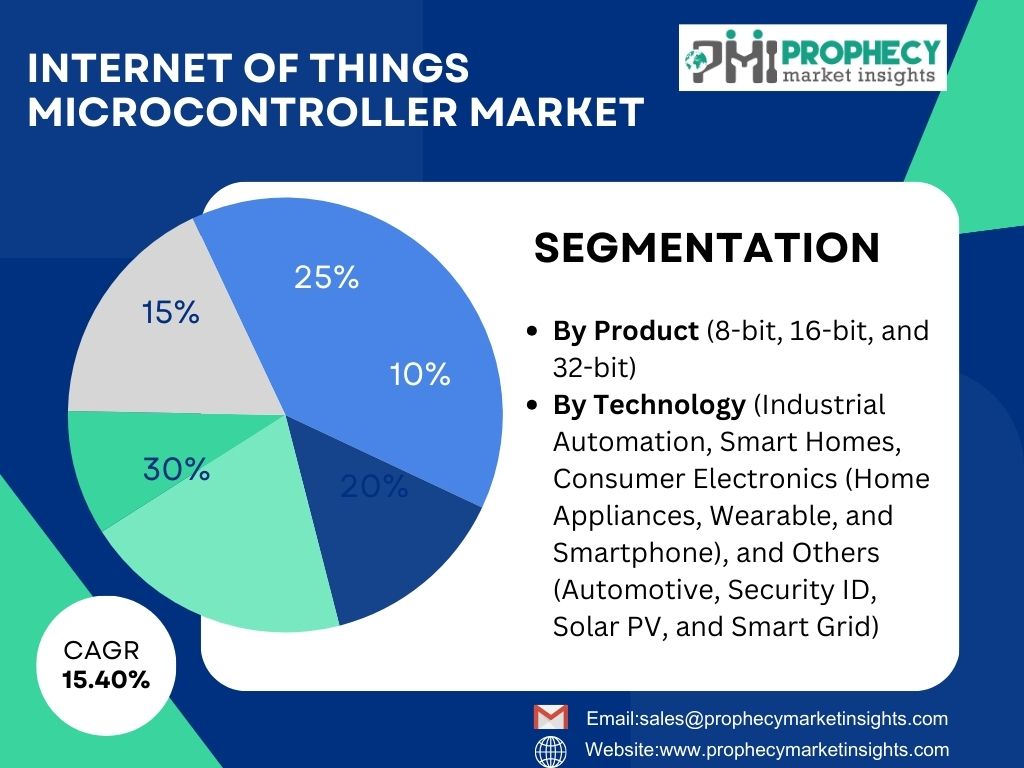
Internet of Things (IoT) has emerged as a transformative force, connecting devices and enabling seamless communication across various industries. At the heart of this interconnected ecosystem are IoT microcontrollers, compact yet powerful devices that play a pivotal role in processing and transmitting data between IoT devices. This article delves into the key trends, growth drivers, challenges, and the future outlook of the IoT Microcontroller Market.
Market Size and Growth:
Internet of Things Microcontroller Market is estimated to reach US$ 8.4 billion in 2024 and is estimated to be US$ 35.2 billion by 2034 and is anticipated to register a CAGR of 15.40%.
𝗧𝗼 𝗮𝗰𝗰𝗲𝘀𝘀 𝘁𝗵𝗲 𝗳𝘂𝗹𝗹 𝗺𝗮𝗿𝗸𝗲𝘁 𝗿𝗲𝘀𝗲𝗮𝗿𝗰𝗵 𝗿𝗲𝗽𝗼𝗿𝘁, 𝗰𝗹𝗶𝗰𝗸 𝗵𝗲𝗿𝗲:
https://www.prophecymarketinsights.com/market_insight/Global-Internet-of-Things-Microcontroller-455
Trends in the IoT Microcontroller Market:
- Rapid Integration of Edge Computing: Edge computing, the processing of data near the source rather than relying on a centralized cloud, is a major trend in the IoT Microcontroller market. As the demand for real-time data processing grows, microcontrollers with edge computing capabilities become essential for optimizing IoT systems’ efficiency and reducing latency.
- Proliferation of Low-Power Microcontrollers: With a focus on energy efficiency and prolonged battery life, low-power microcontrollers are gaining prominence in the IoT space. These microcontrollers are essential for IoT devices powered by batteries or energy-harvesting solutions, catering to the increasing demand for sustainable and long-lasting IoT deployments.
- Security Integration in Microcontrollers: Addressing the growing concerns about IoT security, microcontrollers are incorporating robust security features. Secure boot mechanisms, encryption algorithms, and hardware-based security modules are being integrated into IoT microcontrollers to safeguard data and ensure the integrity of connected devices and networks.
- Customization and Configurability: IoT applications vary widely, and to meet diverse requirements, microcontroller manufacturers are focusing on providing customizable and configurable solutions. This trend enables developers to tailor microcontrollers to specific use cases, ensuring optimal performance and resource utilization.
Request Your Free Sample Now!
https://www.prophecymarketinsights.com/market_insight/Insight/request-sample/455
Key players operating in the internet of things microcontroller market includes,
- Atmel Corporation
- Freescale Semiconductor, Ltd.
- Infineon Technologies AG
- STMicroelectronics N.V.
- Samsung Electronics Co., Ltd
- Texas Instruments Incorporated
- Fujitsu Ltd
- Microchip Technology Incorporated
- Silicon Laboratories, Inc
- Qualcomm, Inc
- ARM Holdings Plc
- Broadcom Corporation
- Freescale Semiconductor, Inc.
Download a PDF Brochure:
https://www.prophecymarketinsights.com/market_insight/Insight/request-pdf/455
Growth Drivers:
- Proliferation of IoT Devices Across Industries: The widespread adoption of IoT across industries, including healthcare, manufacturing, agriculture, and smart cities, is a key driver for the IoT microcontroller market. As the number of connected devices continues to grow, the demand for microcontrollers that can efficiently manage communication and data processing is on the rise.
- Advancements in Wireless Communication Technologies: The evolution of wireless communication technologies, such as 5G and LPWAN (Low Power Wide Area Network), is driving the demand for advanced IoT microcontrollers. These technologies facilitate faster and more reliable data transfer, enabling a seamless and responsive IoT ecosystem.
- Industry 4.0 and Smart Manufacturing: The integration of IoT microcontrollers is a cornerstone of Industry 4.0 and smart manufacturing initiatives. Microcontrollers enable the connectivity and coordination of devices in smart factories, optimizing processes, enhancing efficiency, and supporting predictive maintenance.
- Government Initiatives and Standards: Governments and regulatory bodies are recognizing the transformative potential of IoT and are implementing initiatives to encourage its adoption. The development and adherence to standards for IoT devices, including microcontrollers, are crucial for ensuring interoperability, security, and the overall success of IoT deployments.
Segmentation:
- By Product (8-bit, 16-bit, and 32-bit)
- By Technology (Industrial Automation, Smart Homes, Consumer Electronics (Home Appliances, Wearable, and Smartphone)
- Others (Automotive, Security ID, Solar PV, and Smart Grid), and By Region (North America, Europe, Asia Pacific, Latin America, Middle East, and Africa) – Trends, Analysis and Forecast till 2029
Challenges:
- Security Concerns: While security features are being integrated into IoT microcontrollers, the increasing complexity of IoT systems poses ongoing challenges. Addressing potential vulnerabilities, ensuring secure device onboarding, and protecting against cyber threats remain key focus areas for the industry.
- Interoperability Challenges: The diversity of IoT applications and devices can lead to interoperability challenges. Ensuring seamless communication and data exchange between devices from different manufacturers requires standardized protocols and concerted efforts to establish compatibility.
- Power Consumption and Energy Harvesting: Despite advancements in low-power microcontrollers, power consumption remains a concern, particularly for battery-powered IoT devices. Innovations in energy harvesting and more efficient power management solutions are needed to address this challenge and extend the lifespan of IoT devices.
Future Outlook:
The IoT Microcontroller market is poised for continued growth as IoT adoption accelerates across industries. The future holds exciting possibilities with further integration of edge computing, enhanced security measures, and the development of highly specialized microcontrollers for specific applications. As the IoT ecosystem evolves, microcontrollers will play a central role in shaping the connectivity, intelligence, and efficiency of connected devices.
In conclusion, the Internet of Things Microcontroller market is at the forefront of the IoT revolution, providing the essential hardware foundation for connected devices. The convergence of technological advancements, industry initiatives, and the increasing ubiquity of IoT applications positions microcontrollers as key enablers of a connected and intelligent future. Stakeholders, including manufacturers, developers, and policymakers, must collaboratively navigate challenges and seize opportunities to unlock the full potential of the IoT Microcontroller market.
To know more
Contact Us:
Sales
Prophecy Market Insights
📞+1 860 531 2574
✉ Email– sales@prophecymarketinsights.com
🌐 Website- www.prophecymarketinsights.com
🌐 Blog- www.prophecyjournals.com
Follow us on: